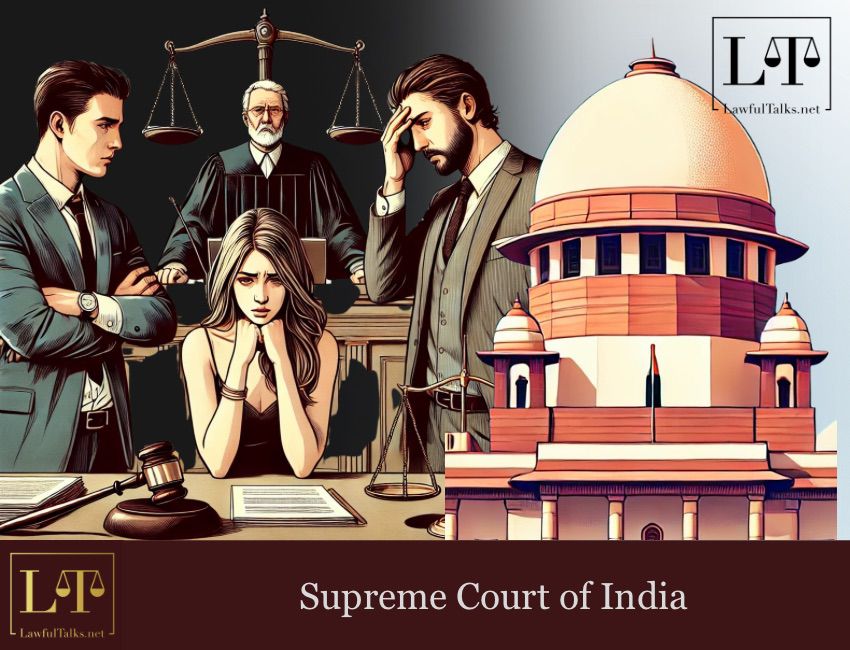Allahabad HC Sets Aside Afzal Ansari's Conviction, Allows Him to Continue as MP

“It must be borne in mind that the right to maintenance u/s. 125 CrPC is not a benefit received by a wife but rather a legal and moral duty owed by the husband.”...Supreme Court.
The Supreme Court bench of Justice BV Nagarathna and Justice Satish Chandra Sharma overturned the Telangana High Court's order and clarified that a woman can claim maintenance from her second husband under Section 125 of Cr.P.C., even if her first marriage was not legally dissolved. The Court emphasized that a formal divorce decree is not necessary, and mutual separation between the woman and her first husband is sufficient for seeking maintenance. Reinforcing that the purpose of social welfare maintenance laws should be to ensure that women are not deprived of financial support due to legal technicalities in their marital status.

A brief background of this case is that Smt. N. Usha Rani (Appellant No. 1) married Nomula Srinivas in 1999 and had a son, but they separated in 2005. They signed a Memorandum of Understanding (MoU) to dissolve their marriage on 25th November, 2005. Shortly after, on 27th November, 2005, she married the Respondent who was her neighbour. The Respondent then preferred a petition u/s.12 of the Hindu Marriage Act, 1956 (‘HMA’) r/w. Section 7 of the Family Courts Act, 1984 seeking dissolution of marriage dated 27th November, 2005. The prayer was allowed by the Family Court, by decree dated 1st February, 2006 and the marriage between Appellant No. 1 and the Respondent was declared null and void.
Despite this, she remarried the Respondent on 14th February, 2006, which was registered and a certificate to that effect was issued by the Registrar of Marriage, Chikkadpally, Hyderabad on 11th September, 2006. They later on, had a daughter, Venkata Harshini, (Appellant No. 2) in 2008. Due to marital disputes thereafter, she filed a complaint against the Respondent and his family members for offences u/s. 498A, 406, 506, 420 of Indian Penal Code read with Sections 3 and 4 of the Dowry Prohibition Act, 1961 and sought maintenance under Section 125 CrPC.
The Family Court granted maintenance to her and her daughter, but the High Court set aside the Appellant No.1’s maintenance concurrently letting Appellant No.2 to continue to get maintenance. The court reasoned that since the Appellant No. 1’s first marriage was not legally dissolved, she was not the Respondent’s legal wife. Aggrieved, she appealed to the Supreme Court.
The Appellants' counsel argued that since Appellant No. 1 and the Respondent lived as a married couple and raised a child together, she should be entitled to maintenance. They relied on Rameshchandra Rampratapji Daga v. Rameshwari Rameshchandra Daga (2005), where the Supreme Court upheld maintenance for a wife from her second husband despite her first marriage not being legally dissolved, as she had given a customary divorce and had not concealed her first marriage. They also cited Chanmuniya v. Virendra Kumar Singh Kushwaha (2011), where the Court emphasized that Section 125 CrPC should be interpreted broadly to include live-in partners, preventing men from avoiding marital obligations by exploiting legal loopholes.
The Respondent's counsel opposed the maintenance claim, arguing that Appellant No. 1 cannot be considered a "wife" under Section 125 CrPC since her first marriage was still legally subsisting. They relied on Savitaben Somabhai Bhatiya v. State of Gujarat (2005), where the Supreme Court dismissed a second wife's maintenance claim, ruling that the law does not recognize a woman as a "wife" if the husband's first marriage is still valid. The Court emphasized that even if the husband treated the claimant as his wife or concealed his first marriage, the legislative intent was clear—only legally married women could claim maintenance. Similarly, since Appellant No. 1’s first marriage was not legally dissolved, she could not claim maintenance from the Respondent.
It was Respondent’s contention that his marriage with Appellant No. 1 was void ab initio due to the subsistence of her first marriage. However, the Family Court’s finding that they were married remained undisputed. Crucially, the Respondent was aware of Appellant No. 1’s first marriage before marrying her yet again and although she lacked a formal divorce decree, she had separated from her first husband through a Memorandum of Understanding and received no maintenance from him.
Noting submissions of both sides, the Supreme Court emphasized that Section 125 CrPC is a welfare provision meant to prevent destitution and should be interpreted expansively. Denying maintenance here would allow the Respondent to benefit from the marriage while avoiding his responsibilities. Citing Mohd. Abdul Samad v. State of Telangana (2024), the Court reiterated that maintenance is not merely a benefit for the wife but a legal and moral duty of the husband.
Accordingly, the appeal was allowed and the maintenance award granted by the Family Court dated 26 July, 2012 was restored.
Case Title: Smt. N. Usha Rani And Anr. Vs. Moodudula Srinivas, Crl.A. No. 515 / 2025
Advocate for the Petitioner: Shekhar Kumar
Advocate for the Respondent: D. Mahesh Babu

Anushka Bandekar
Advocate
Latest Posts
Categories
- International News 19 Posts
- Supreme Court 390 Posts
- High Courts 383 Posts



















































































































































































































































































































































































































































































































































































































































































































































































































